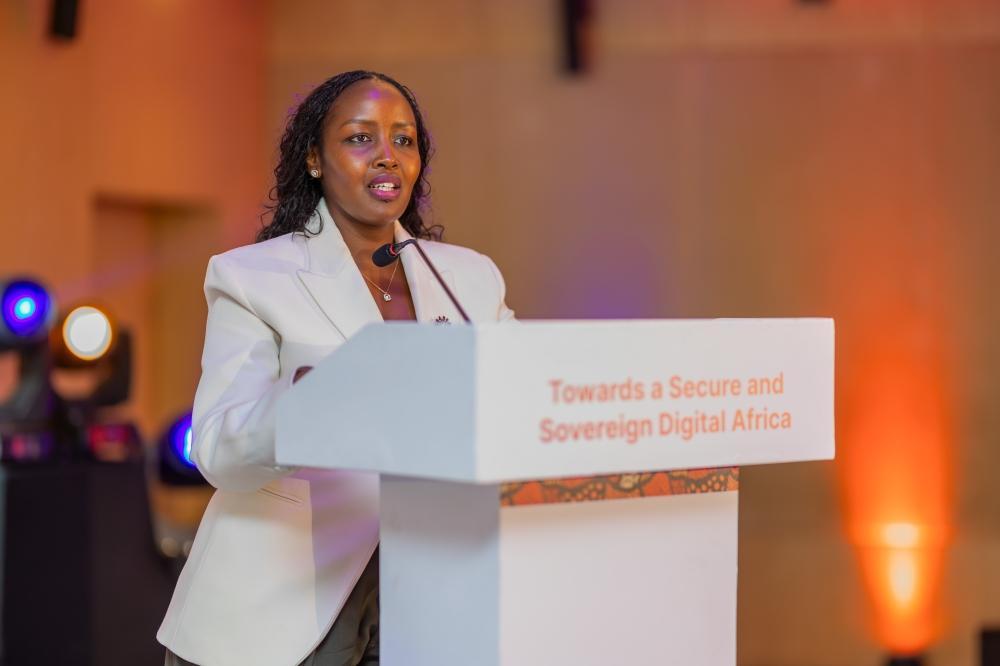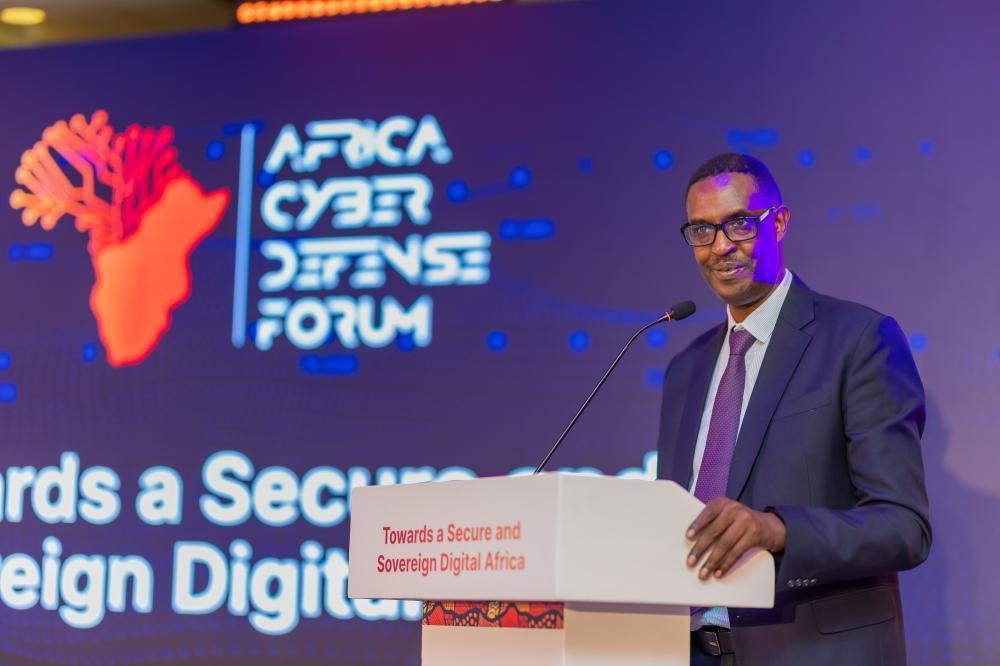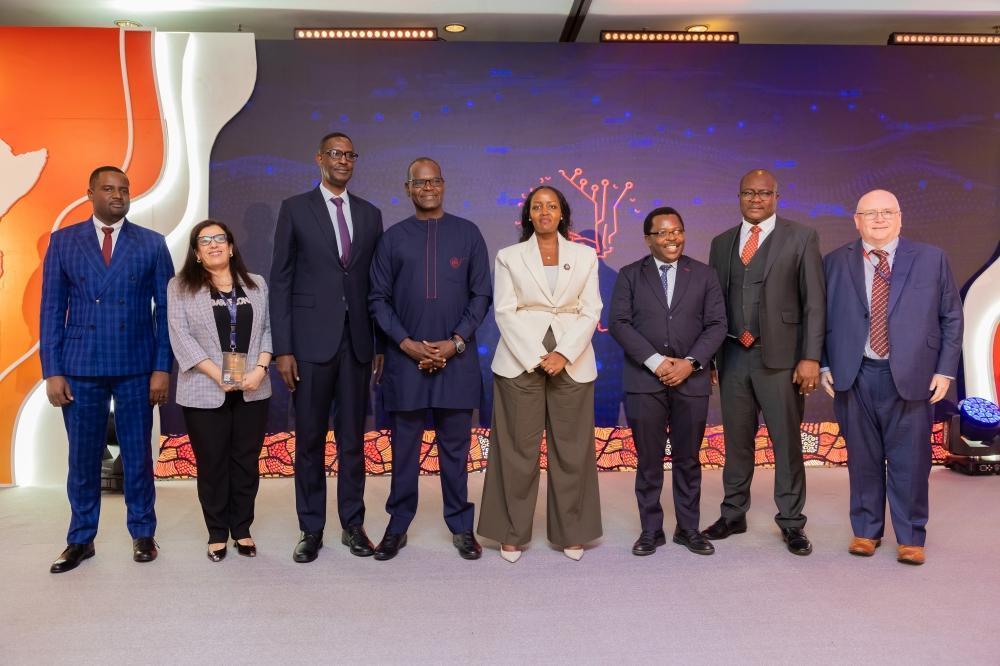Africa-Press – Rwanda. Africa cannot claim digital sovereignty without taking bold steps to control its own data, infrastructure, and cyber defences, leaders said on Tuesday, October 2, at the Africa Cyber Defence Forum in Kigali.
The sixth edition of the forum brought together policymakers, industry leaders, and cybersecurity experts to tackle one of the continent’s most urgent challenges: How to secure Africa’s fast-growing digital economies against escalating cyber threats while reducing dependency on foreign technologies.
David Kanamugire, CEO of Rwanda’s National Cyber Security Agency, noted that Africa has the challenge of confronting uncomfortable realities about its vulnerability in the digital age.
David Kanamugire, CEO of Rwanda’s National Cyber Security Agency, speaks at the Africa Cyber Defence Forum, in Kigali on Wednesday, October 1.
“How can we be sovereign if less than 2% of global data centre capacity is in Africa, and even that is not owned by Africans?” he asked. “We must find the courage to address the serious issues that will shape our digital future.”
Kanamugire said the forum was not a routine gathering but an important assembly that deliberates on the future of the African continent.
“This is not just a conference,” he said. “It’s about deciding Africa’s future in the digital age.”
This year’s edition ran under the theme “Towards a Secure and Sovereign Digital Africa.” Officials pointed to the promise of digital transformation, but also warned of the dangers Africa faces if it fails to keep pace.
Rwanda’s Minister of ICT and Innovation, Paula Musoni, reminded participants of the scale of cyber threats.
“Cybercrime has already cost us billions, but beyond the money, it undermines trust and threatens national sovereignty,” Ingabire said. “If one African country is vulnerable, the entire continent is exposed.”
Ingabire outlined Rwanda’s measures to strengthen its resilience, including the launch of a continental cyber hub centre of excellence, designed to serve as a platform for research, training, and collaboration.
“This hub will be open to all Africans,” she said, adding that Rwanda is also introducing new university programmes in artificial intelligence and cybersecurity to build the next generation of specialists.
The minister pressed for harmonised legislation across Africa, pointing to gaps in data protection and privacy laws, and called for investment in talent pipelines to prevent brain drain.
“Africa cannot afford to move incrementally when the threats are growing exponentially. The time for action is now,” she said.
“I challenge every single company represented here. Do not leave our young talents behind. Offer them placements, mentorships, and opportunities to grow. Our sovereignty depends not only on infrastructure but also on people.”
Gilbert Nyandeje, founder and CEO of the Africa Cyber Defence Forum, argued that sovereignty cannot exist without local innovation.
“This is not sovereignty when we depend on foreign solutions. This is dependency, and that is a disease we must cure,” he said.
Nyandeje urged participants to treat the forum as a platform for tangible action. “When you leave this forum, we don’t just want speeches. We want MOUs signed, data centres built, investments made. That is our metric of success,” he declared.
He emphasised that if Africa hopes to avoid being locked into perpetual dependency on external actors, it must own its digital foundations, resilient data centres, sovereign cloud systems, and trusted AI infrastructure.
“Without these foundations, Africa will always be a customer and never an architect. Think about that,” he said.
Officials pose for a family photo at the Africa Cyber Defence Forum in Kigali on Wednesday, October 1.
The forum also focused on the need for stronger collaboration among African states, particularly in sharing intelligence on cyber threats. Officials noted that cybercrime is inherently transnational, with criminals often exploiting porous borders and weak enforcement mechanisms.
“No single country can do it alone,” Nyandeje said. “We must create frameworks for sharing threat intelligence across the continent to protect our critical infrastructure.”
Officials also discussed updating outdated legal instruments, such as the African Union’s Malabo Convention on data protection and cybersecurity, which was adopted in 2014.
“The realities we live in today are not the same as those we had in 2014,” Nyandeje noted, calling for policymakers to modernise legal frameworks to keep pace with emerging threats.
For More News And Analysis About Rwanda Follow Africa-Press








